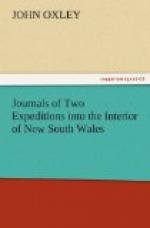INTRODUCTION.
The colony had been established many years before any successful attempt had been made to penetrate into the interior of the country, by crossing the range of hills, known to the colonists as the Blue Mountains: these mountains were considered as the boundary of the settlements westward, the country beyond them being deemed inaccessible.
The year 1813 proving extremely dry, the grass was nearly all destroyed, and the water failed; the horned cattle suffered severely from this drought, and died in great numbers. It was at this period that three gentlemen, Lieutenant Lawson, of the Royal Veteran Company, Messrs. Blaxland, and William Wentworth, determined upon attempting a passage across these mountains, in hopes of finding a country which would afford support to their herds during this trying season.
They crossed the Nepean River at Emu Plains, and ascending the first range of mountains, were entangled among gullies and deep ravines for a considerable time, insomuch that they began to despair of ultimate success. At length they were fortunate enough to find a main dividing range, along the ridge of which they travelled, observing that it led them westward. After suffering many hardships, their distinguished perseverance was at length rewarded by the view of a country, which at first sight promised them all they could wish.
Into this Land of Promise they descended by a steep mountain, which Governor Macquarie has since named Mount York [Note: This mountain was found to be 795 feet in perpendicular height above the vale of Clwydd.]. The valley [Note: Named by Governor Macquarie the Vale of Clwydd.] to which it gave them access was covered with grass, and well watered by a small stream running easterly, and which was subsequently found to fall into the Nepean River. From Mount York they proceeded westerly eight or ten miles, passing during the latter part of the way through an open country, but broken into steep hills. Seeing that the stream before mentioned as watering the valley ran easterly, it was evident they had not yet crossed the ranges which it was supposed would give source to waters falling westerly; they had however proceeded sufficiently far for their purpose, and ascertained that no serious obstacles existed to a farther progress westward.
Their provisions being nearly expended, they returned to Sydney, after an absence of little more than a month; and the report of their discoveries opened new prospects to the colonists, who had began to fear that their narrow and confined limits would not long afford pasture and subsistence for their greatly increasing flocks and herds.




